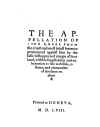|
Knox`s Appellation.

The
Appellation is also a helpful reprise of Knox`s
doctrine.
He taught, that there is no other name by which men can be
saved but that of Jesus, and that all reliance on the
merits of others is vain and delusive; that the Saviour
having by his own sacrifice sanctified and reconciled to
God those who should inherit the promised kingdom, all
other sacrifices which men pretend to offer for sin are
blasphemous ; that all men ought to hate sin, which is so
odious before God that no sacrifice but the death of his
Son could satisfy for it; that they ought to magnify their
heavenly Father, who did not spare him who is the
substance of his glory, but gave him up to suffer the
ignominious and cruel death of the cross for us; and that
those who have been washed from their former sins are
bound to lead a new life, fighting against the lusts of
the flesh, and studying to glorify God by good works. In
conformity with the certification of his Master, that he
would deny and be ashamed of those who should deny and be
ashamed of him and his words before a wicked generation,
he farther taught, that it is incumbent on those who hope
for life everlasting, to make an open profession of the
doctrine of Christ, and to avoid idolatry, superstition,
vain religion, and, in one word, every way of worship
which is destitute of authority from the word of God. This
doctrine he did believe so conformable to God’s holy
Scriptures, that he thought no creature could have been so
impudent as to deny any point or article of it; yet had
the false bishops and ungodly clergy condemned him as a
heretic, and his doctrine as heretical, and pronounced
against him the sentence of death, in testimony of which
they had burnt his effigy from which sentence he
appealed to a lawful and general council, to be held
agreeably to ancient laws and canons; humbly requesting
the nobility and commons of Scotland, to take him, and
others who were accused and persecuted, under their
protection, until such time as these controversies were
decided, and to regard this his plain Appellation of no
less effect, than if it had been made with the accustomed
solemnity and ceremonies.
|